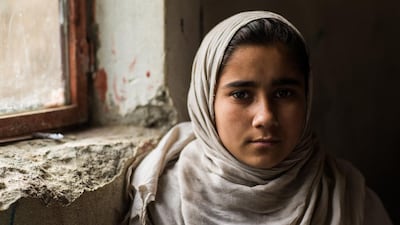JALALABAD // Ten-year-old Nazdana has big ambitions.
“I want to be a soldier in the Afghan army,” she declares proudly. “My army will reclaim our village and bring peace to the people of Samarkhail [her native region].”
Nazdana is a pupil at the school for the children of internally displaced people (IDP) set up by the Norwegian Refugee Council (NRC) outside Jalalabad city in Nangarhar province. Ironically, it is Nazdana’s status as an IDP that has enabled her to have far bigger dreams than life in her deeply conservative community in Samarkhail would have allowed.
Forced to uproot because of fighting by insurgents, Nazdana’s family have spent eight years moving from one temporary settlement to another.
Her father recently went to Iran to earn money to support the family, leaving her mother to as the decision-maker. And she decided to send three of her five daughters to the IDP school.
Nazdana and her sisters are probably the first girls in many generations of their family to get an education. The girls – 10, 12 and 13 years old – are now on a fast-track programme created by NRC for children of displaced families.
The three-year course, called Education in Emergency, aims to bring children like them up to the seventh grade and help them reintegrate into Afghanistan’s formal secondary education system.
In addition to the traditional view that educating girls is not important, those who do go to school often do not stay very long.
“While even one year of schooling can prevent or delay child marriage, and make girls literate, it usually takes more than one to three years of schooling to empower girls,” said Afghan gender activist Noorjahn Akbar. “The larger problem in Afghanistan is that while girls go to primary school, they drop out before or soon after puberty.”
Conflict in Afghanistan has driven thousands of young children out of school. Of the 250,000 Afghan refugees who were forced to return from Pakistan in the last year, an estimated 150,000 boys and girls under the age of 18 have never gone to school before.
“We are facing unprecedented levels of displaced, out-of-school children,” said William Carter, NRC’s programme director in Kabul.
The patriarchal structure of Afghan society places little value on educating girls. Between 2008 and 2012, Unicef recorded 46.4 per cent of girls attending primary school but only 21 per cent in secondary level.
Since the fall of the Taliban in 2001, about 3.5 million are still not in school and nearly 70 per cent of them are girls, said Aziz Froutan, Unicef’s communications officer.
Not every village has a separate school for girls - an important consideration for a country with strict gender segregation. And the costs of education – relatively high compared to the income of poor families – means boys will always get priority over girls in education, said Mr Froutan.
But for some girls, their IDP status has actually given them access to schooling and often for the first time.
“We see quite a few families allowing their daughters to attend school for the first time. In some families, this is the first generation of daughters getting education,” Mr Carter said.
Protection from militancy and marriage is another benefit of schools for the displaced. Young boys who are not in school are prime targets for forced recruitment into militant groups while young girls staying at home are more likely to be married off early.
Research among Iraqi and Syrian women (there is none from Afghanistan) has shown that girls who make it past fifth grade are less likely to face early marriage and death during childbirth.
Nazdana’s best friend, 10-year-old Tamanna and her family fled their village in Laghma, about 50km from Jalalabad, where fighting continues. She too is the first girl in her family to go to school and now wants to be a teacher herself.
“We don’t have much there [in the village] anyway, and I’m happier here, because I’m getting an education,” Tamanna said.
For girls like them, their displacement has ironically brought an unexpected benefit.
“There is an opportunity to build a more educated female workforce hopefully, and better gender equality in the future,” Mr Carter said.
foreign.desk@thenational.ae

